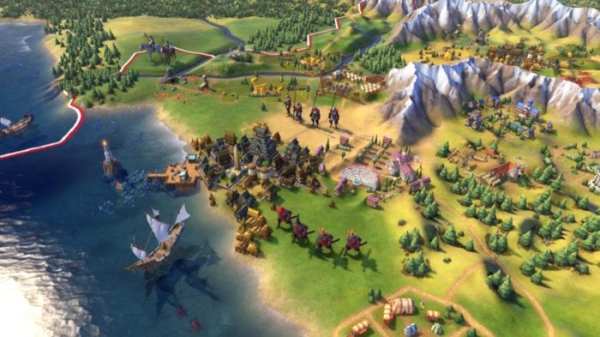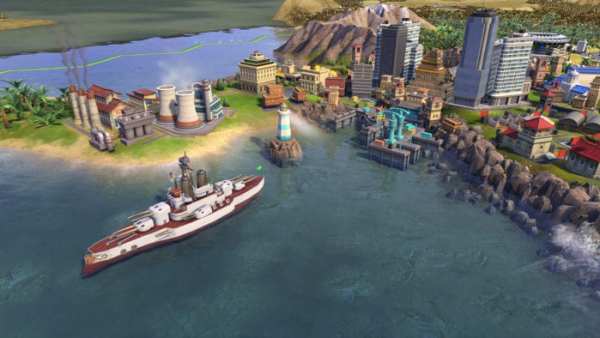Civilization VI on PC
Civilization VI is in a league of its own. The series has already earned its reputation for being one of the deepest, most tactical, and addictive turn-based strategy of all times. Somehow, someway though, Firaxis Games finds a way to top themselves. Civilization VI is no different and continues the series’ commitment to excellence.
Civilization V was a great game, but at launch some felt that it took a few steps forward, but one step back; dumbing down some elements that were featured in previous iterations. While its two expansions eventually improved a lot of issues, Civilization VI is a tight product right out of the gate. Firaxis Games opted for building on the foundation that Civilization V built rather than reinventing it and it was definitely the right call. Areas in need of improvement, clarity and/or depth got it, and new features were also added that enhances gameplay without overwhelming returning players with its “newness.”
The feature that arguably needed most improvement from Civilization V was diplomacy. At times, AI actions seemed very irrational and random. You could be minding your own business and out of no where a AI leader that you’ve barely ever interacted with would declare war on you. There wasn’t much to actually do in the diplomacy menus, and most games boiled down to either declaring war on someone and being hated by everyone, or isolating yourself to go for a non-violent victory and still eventually have people declare war on you anyway.

There’s still a little bit of that unpredictability in Civilization VI, but diplomacy in general is far less transparent now, making it easier to plan out more nuanced diplomatic relations. You can easily dig in and see what other civ’s agenda/goals are, reasons why they like you and reasons why they might not like you all that much. For example, one way to stay on the good side of Brazil’s leader Pedro II is to avoid competing with him for Great People.
Assuming you play conventionally based on your civ’s strengths, you’ll have a harder or easier time on working with certain civilizations as agendas will overlap in some places. Also, there’s a clear path towards starting a friendship and building that over time into an alliance. It starts with something as simple as sending a delegation (which also sends back useful information about that country for you) and over time building up trust and access through trade, gifts, pacts, and eventually, declarations of friendship and alliances.
Firaxis also found a way to make religion and government building both deeper, and easier to take advantage of. These are elements of Civilization V that were important, but in Civilization VI, take on a life of their own. Playing to win through religious conquest is an entirely new (and enjoyable) experience in Civilization VI. You start by building pantheons that provide you small bonuses depending on which deity you want to worship and over time if you meet certain conditions, you can be one of the few civs that gets to found a religion of your own. You’ll generate faith currency which can then be used to purchase units such as missionaries and apostles to spread your religion to different cities, and even engage in theological warfare with other missionaries you might run into. It’s a welcomed addition that is non-violent while also forcing you to get out and move around the map unlike some more isolationist win conditions. Regardless of what win-condition you shoot for, though, you’ll be able to build up a government over time that will help serve your needs.
The civics tree is now just as in-depth as science has always been. As you work your way through it, you can unlock policies that will shape the way your government acts and, depending on which government you elect to build up to, you earn the ability to use more of different kinds of policies. For example, democracies have the ability to stack up a lot of economic and diplomatic policies, while Facism focuses on militaristic policies. Again, this is another case where there was nothing wrong with how Civ V approached government, but Civ VI just takes it a whole new level.

Running through all of the new and improved returning features that are present in Civilization VI would take multiple articles, but overall they all contribute towards making Civilization VI a leaner, more streamlined experience without sacrificing strategy. The best of all is probably the changes made to builders/workers. In Civilization V, after thousands of years worth of turns, you’ll end up with a ton of builders you forgot even existed that are all doing a whole lot of nothing once you’ve built up most of your land. Also, roads were extremely cumbersome to build and expensive to maintain. That’s all thrown out. Builders are created as you need them, and vanish after working on three tiles. If you’re worried about roads with this new system, don’t be, they are a thing of the past. If you want easy access from your capital to other important cities, establish trade routes and roads will be created naturally over time.
Speaking of cities, through the new district feature, it’s easier to give each city their own personality and let them naturally develop strengths based on the environment around them. Instead of just every city running through the building tech tree, you must first create districts which house new buildings for you to construct. Districts must occupy a tile and depending on the cities’ geography, not every city will have access to every district. Ultimately, this makes city building more strategic. Districts take a good amount of time to build, so you need carefully plan out how each city will develop over time, and what purpose they will serve in your overall goal of winning the game. If you’re at war, make sure to build a military encampment district first on the cities that are on the fringes of your border. If you’re aggressively spreading a new religion, consider getting holy site districts up and running as soon as possible in all of your cities.
The features we touched on above are just some of the game-changing and quality of life improvements that Civilization VI has brought to the table. We could go on and on with praise, but really all you need to know is this: Civilization VI is still the supreme deity of historical turn-based strategy games. Sure, there are a few technical issues. Load times can be lengthy, and multiplayer could definitely be a lot more stable. However, none of those problems are big enough issue to put a dent in Civilization VI’s armor. If you love the series, history, politics, and/or turn-based games, Civilization VI is a must own.
Score: 5/5 – Exemplary
Pros
| Cons
|

